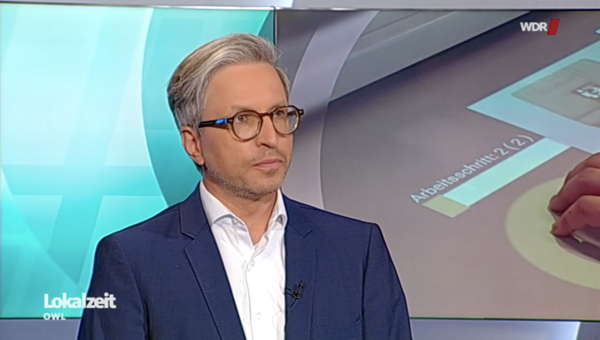Digital assistance systems are becoming increasingly important and are finding their way into various companies and industries. They help with collaboration between humans and machines, but also change workflows and processes. Many companies now recognize the importance of digitizing processes. Higher productivity and better product quality are just two examples of the resulting benefits. But digital assistance systems for the work and learning process should also bring benefits for employees.
The Institute for Industrial Information Technology (inIT) is currently working on the second aspect in the project "enableIT: Technology-supported inclusion through human-centered system analysis and assistance in industry". Through the goal-oriented use of technology, people with and without disabilities are to be enabled to work in a shared production environment. This is intended to advance workplace inclusion.
The assistance system developed consists of a computer, a monitor, a beamer and a depth-image camera. This checks the employee's work steps at a manual workstation. With digital assembly instructions, he is guided step by step through the construction process. Colored displays detect mistakes before they are made. Because if the employee reaches into the wrong box with the wrong screws, for example, a red light appears immediately and it is not possible to get the next step displayed. "Our assistance system is already in use at INTEG GmbH in Bad Driburg. People with and without disabilities work together there. People with disabilities often have difficulty finding a job that meets their needs and gives them the opportunity to pursue a fulfilling activity and live independently. We want to use digital technologies to ensure that people can fully contribute their skills and are not excluded from the labor market because of individual limitations," says Professor Carsten Röcker, deputy director of the institute at inIT.
The project has meanwhile also attracted attention in the media. Professor Carsten Röcker was most recently invited by broadcaster WDR as a studio guest on LokalzeitOWL. "It is nice that this topic is becoming more and more present and that we can thus show the possibilities that already exist and hopefully also ensure more acceptance for the use of assistance systems. After all, the introduction of new technologies naturally always brings with it obstacles and challenges during implementation," says Röcker. As he reported to LokalzeitOWL, such systems can be used not only in industry, but also in nursing and medicine.
Asked what steps will be tackled in the future, Professor Röcker replies, "We are always working to open up opportunities for people that they might not otherwise have. In the future, we want to make our assistance systems more adaptive with artificial intelligence. In this way, the digital assistants will automatically adapt to the abilities of the employees." So the motto is to support people in their strengths and weaknesses.


